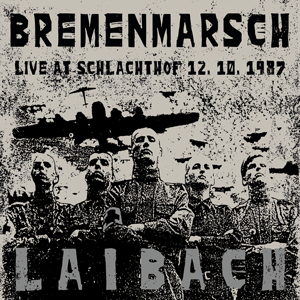
Laibach – Bremenmarsch Live At Schlachthof 12.10.1987
Laibach is art, but more than just art. Founded on 1st June 1980 in the then heavy industrial Yugoslavian town of Trbovlje (today a city in central Slovenia), the band took their name after the German designation of the Slovenian capital Ljubljana which was undesirable in Yugoslavia during the Tito’s and post-Tito era. In 1982 the group played its first concerts in Ljubljana, Zagreb and Belgrade on their “Tour of the Three Capitals”. On 23rd June 1983, Laibach appeared for the first time on Slovenian television in the political program TV Tednik. The band’s provocative performance led to a ban on the name and a ban on performing in Yugoslavia until 1987: “The politicial ruling powers couldn’t bear the image they saw in the mirrors we held up to them,” a member of Laibach once said.
In 1985 the Škuc – R.o.p.o.t (Noise) label released the first official Laibach album, but, due to the ban on naming, without mentioning the band name on the cover and with censorship bleeps on some samples of Tito’s speeches. In the same year, the German alternative label Walter Ulbricht Schallfolien released the album “Rekapitulacija 1980-1984″ and the English label Cherry Red Records released the single “Die Liebe ist die größte Kraft, die alles schafft”. Walter Ulbricht Schallfolien, who also had with Throbbing Gristle the most important representatives of Industrial under contract, then brought Laibach into German clubs and concert halls for the first proper German tour in 1985. The tour happened under the title “Die erste Bomardierung! Laibach über dem Deutschland” (“The first bom(b)ing – Laibach over the Germany”). In 1986 Laibach released the album “The Occupied Europe Tour 1985″ on the US label Side Effects, the oldest label for industrial music in America. In addition, the album “Nova Akropola” was released in February 1986 on Cherry Red Records. Same year the band was a guest of John Peel, but the recordings from the “John Peel Session” were not released until 16 years later. In 1987 Laibach signed a long-term contract with Daniel Miller’s renowned London Mute Label and had finally found their musical home. The artists roster of Mute included such well-known artists as Depeche Mode, Nick Cave, Erasure, Yazoo, Moby and also Kraftwerk. From now on the commercial success story of Laibach could also be written.
Mute released “Opus Dei”. The album includes, inter alia, a specific “Laibach” – interpretation of “Live Is Life”, the big single hit of the Austrian group Opus (one as a German version under the name “Leben heißt Leben” as well as an English version under the title “Opus Dei”) and also the interpretation of the Queen track “One Vision” (in German under “Geburt einer Nation”). The sound of Laibach had become more commercial, the avant-garde and industrial parts gave way in favour to Laibach’s “militant classicism”, the band had found its style. Laibach went on tour, now playing in larger halls and clubs in Germany. On 12th October 1987 Laibach made a stop at the Bremen Schlachthof. Here the live album “Bremermarsch” was recorded, which is now released 33 years later. In spring 2020 Laibach edited the “old” original recordings and digitally mastered them in their studio. The recordings sound fresh and unspent, the sound is great, the mood in the audience as well. And that Laibach is performing the “hits” such as “Die Liebe”, “Life is Life” and “Geburt einer Nation” (Birth of a Nation) can almost be taken for granted.
Tracklist:
LP Side A:
- Leben-Tod 04:31
- Država (Machen wir Deutschland wieder frei) 03:23
- Trans-national 04:46
- Krvava gruda - plodna zemlja 04:40
- Die Liebe 03:46
LP Side B:
- How the West Was Won 04:21
- Leben heisst Leben 05:25
- Geburt einer Nation 05:09
- Life is Life 05:38
Total: 47:05 Min.
CD:
- Intro (Radio Ansage) 00:32
- Leben-Tod 03:59
- Država (Machen wir Deutschland wieder frei) 03:23
- Trans-national 04:46
- Krvava gruda - plodna zemlja 04:40
- Die Liebe 03:46
- Ti, ki izzivaš 07:46
- Krst 05:27
- How the West Was Won 04:21
- Leben heisst Leben 05:26
- Geburt einer Nation 05:09
- Agnus Dei (Acropolis, Exil und Tod) 02:52
- Wutachschlucht (Fragment) 04:02
- Life is Life 05:38
Total: 61:47 Min
